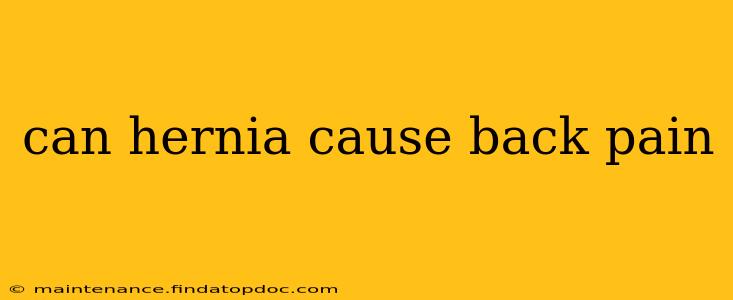Back pain is a common ailment affecting millions, and while many causes exist, hernias are often overlooked as a potential source. While not the most common cause, a hernia can indeed contribute to back pain, depending on its location and severity. This comprehensive guide explores the relationship between hernias and back pain, answering frequently asked questions to provide clarity and understanding.
What is a Hernia?
Before delving into the connection between hernias and back pain, let's establish a clear understanding of what a hernia is. A hernia occurs when an organ or fatty tissue pushes through a weak spot in the surrounding muscle or connective tissue. This most commonly happens in the abdomen, but hernias can occur elsewhere in the body.
There are several types of hernias, each with its potential to cause back pain, including:
- Hiatal Hernia: This occurs when a portion of the stomach pushes up through the diaphragm, the muscle separating the chest and abdomen. While often asymptomatic, it can cause heartburn and, in some cases, back pain.
- Inguinal Hernia: This is the most common type, occurring when part of the intestine protrudes through a weak point in the abdominal wall in the groin area. While pain is usually felt in the groin, it can sometimes radiate to the lower back.
- Spinal Hernia (Disc Herniation): This involves the displacement of the soft, gel-like center of an intervertebral disc. This is not technically a hernia in the same sense as abdominal hernias but is often discussed in the same context due to its potential to cause back pain. It's important to note that disc herniations are a completely different mechanism of injury than the abdominal hernias discussed above.
How Can a Hernia Cause Back Pain?
The mechanism by which a hernia causes back pain varies depending on the type of hernia.
-
Referred Pain: Pain from an abdominal hernia can sometimes be felt in the back due to the complex network of nerves in the abdominal and back regions. This "referred pain" is a phenomenon where pain is felt in a location different from the source of the problem. For example, pain originating from an inguinal hernia might be misinterpreted as lower back pain.
-
Pressure and Irritation: The bulge caused by a hernia can put pressure on surrounding nerves and tissues, leading to pain in the back, especially if the hernia is large or is causing inflammation.
-
Muscle Strain: The body might try to compensate for the hernia by tightening surrounding muscles, which can lead to muscle strain and back pain. This is particularly relevant in cases of abdominal hernias, especially larger ones.
-
In the case of a spinal hernia (disc herniation): The displaced disc material can press on spinal nerves, causing pain that radiates to the back, legs, and/or buttocks. This is a different mechanism entirely than that of abdominal hernias, but is the common understanding when someone talks about a "hernia" and back pain in casual conversation.
Can a Hiatal Hernia Cause Back Pain?
Yes, although less common than other hernia types, a hiatal hernia can sometimes cause back pain. This is often due to the inflammation and pressure on surrounding structures and nerves. The pain might be felt in the upper back or even between the shoulder blades. However, the most common symptoms are related to heartburn and indigestion.
Can an Inguinal Hernia Cause Back Pain?
While inguinal hernias primarily cause pain in the groin, the pain can radiate to the lower back. This is often due to nerve irritation or muscle tension as the body compensates for the hernia.
What are the Symptoms of a Hernia?
The symptoms of a hernia vary depending on the type and severity. However, common symptoms include:
- Bulge or lump: This is often noticeable when coughing, straining, or standing.
- Pain: This can be dull, aching, or sharp, and may worsen with activity.
- Discomfort: Feelings of pressure, fullness, or heaviness in the affected area.
- Nausea and vomiting (in some cases): Particularly relevant to strangulated hernias where the blood supply is cut off.
When Should I See a Doctor About Back Pain?
If you are experiencing back pain, it is crucial to consult a healthcare professional to determine the underlying cause. They can conduct a thorough examination, possibly including imaging studies, to diagnose any hernias and rule out other potential causes of your back pain. Don't delay seeking medical attention, especially if you notice a bulge or lump, persistent pain, or symptoms of bowel obstruction. Early diagnosis and treatment can prevent complications.
Disclaimer: This information is for educational purposes only and should not be considered medical advice. Always consult with a healthcare professional for diagnosis and treatment of any medical condition.
